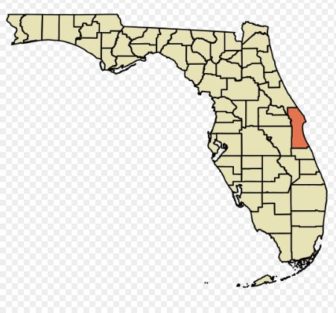TWH – On July 8, 2019, a three-judge panel of the 11th Circuit US Court of Appeals issued a ruling on invocations before governmental meetings.
They found the invocation process of the Board of County Commissioners of Brevard County, Florida to be discriminatory. While it was Atheists and secular humanists, not Wiccans, who brought the suit, the three-judge panel brought up how the Board’s process could discriminate against Wiccans.
The three-judge appellate panel consists of two Clinton-appointed judges, and one appointed by Trump.

Brevard county map Credit: Democratic Luntz at English Wikipedia [detail of larger map]
Kathy Lezon is a Wiccan High Priestess in Brevard County. She also serves as first officer of Everglades Moon Local Council of Covenant of the Goddess which covers all of Florida. She confirmed that local Pagans were not involved in this suit. According to Lezon, Pagans in Florida seldom “give invocations to open government meetings or functions.”
Lezon doesn’t see a place for religious invocations before governmental meetings. Yet, she felt happy about the ruling. She felt the ruling was “a victory against religious discrimination.” She cautioned, “I doubt the ruling would change anyone’s mind and make them more tolerant of paths other than their own.”
However, Lezon felt it would force governmental bodies “to be either more inclusive or, best case scenario, drop the invocation from their meeting agenda altogether.”
According to that ruling, from January 1, 2010 to March 15, 2016, the Brevard County Commission has heard 195 invocations. Non-Christians gave only seven. Rabbis gave six of those invocations. A local official gave the other. Among Christians, non-Protestants gave only seven invocations. Catholic clerics gave five invocations. Mormons and Eastern Orthodox clerics gave one invocation each.
Timeline of events
Plaintiff, David Williamson had requested to give an invocation in May and June of 2014. Williamson sent the request on letterhead of the Central Florida Freethought Community (“CFFC”).
In August of 2014, the Brevard Board sent Williamson a letter, declining his request. In that letter, the Board linked their invocation with the belief in “the highest spiritual authority, a higher authority which a substantial body of Brevard constituents believe to exist.” The Board suggested that CFFC could speak during the public comment section of meeting.
In 2015, other groups and people became involved. Another plaintiff Ronald Gordon, an atheist offered to give an invocation. Ann Fuller, a Unitarian Universalist Church minister offered to give an invocation. The Anti-Defamation League expressed its concern to the Board.
The Board responded to the request to allow humanist invocations with a letter. Part of that letter said, “[Y]our suggestion to allow atheists to provide the invocation would, in fact, show hostility toward the faith-based community.”
In January and May 2015, Americans United for Separation of Church and State (AU), the Freedom from Religion Foundation (FFRF), and the ACLU sent more letters of concern.
On July 7, 2015, the Board passed Resolution 2015-101. That resolution stated that the invocation policy was “not hostile to faith-based religions.” It stated that the policy did “not endorse secular humanism or non-belief over traditional faith-based religions comprised of constituents who believe in God.”
The Resolution further linked invocations with traditional religions. “Pre-meeting invocations shall continue to be delivered by persons from the faith-based community in perpetuation of the Board’s tradition for over forty years.”
That Resolution restricted religions guided by forces of “reason, science, environmental factors, nature, or ethics as guiding forces” to the public comment portion of the meeting.
The Resolution also charged CFFC with offending faith-based groups. The resolution admitted to scrutinizing the websites of FFRF, AU, and CFFC. It pulled “godless quotes from those websites.” According to that Resolution, supplanting a traditional prayer with a non-traditional invocation would constitute County hostility towards monotheistic religions
On September 30, 2017, the US District Court granted summary judgement to the plaintiffs. The court ordered the Board to draft a new policy that would allow each of the plaintiffs to give an invocation. In November of 2017, the Board of Brevard dropped verbal invocation. Instead they adopted “a moments of silence” before Board meetings. The Brevard Board filed an appeal. On July 8, 2019, a three-judge panel of the 11th Circuit US Court of Appeals found the Brevard policy to be unconstitutional.
Legal Reasoning
The judges relied on a three-part test derived from the Pelphrey v. Cobb County, case.
The first test involved who gave the invocations. The panel found no issues with the high number of Christians giving the invocations. Most people in Brevard were Christian.
The second test involved examining the process of selection of people to give invocations. Evidence of exclusion of specific religions would constitute discrimination. The panel did examine the process of the Brevard County.
The third test involved the content of the invocation. They did not examine invocations for their content. The US Supreme Court has discouraged reviewing prayers as an improper intrusion into religion.
The panel found that, before 2015, no official process or standard existed to select people to give the invocation. Each member of the Brevard Board would select someone on a rotating basis. On July 7, 2015, the Board passed Resolution 2015-101 to clarify the process for selecting people to provide invocations.
Seven current and former commissioners testified about how they selected people to give invocations. Some said that they would exclude Deists, Wiccans, Rastafarians, and Polytheists. Some were unsure if they would include a Hindu, Sikh, or someone following a traditional Native American religion.
The three-judge panel found that this favored some religions more than others. Some religions were categorically excluded. Some were more highly scrutinized. The three judge panel found that this process to be unconstitutional.
Brevard County
Brevard County is not some rural county deep in the Bible Belt. The Cape Canaveral Space Center is located in Brevard County. The US space program launches its rockets from this county.

U.S. Air Force/Carleton Bailie [Public domain]
Titan IVB Centaur launching ELINTspy satellite from Cape Cape Canaveral Air Force Station in Brevard County, Credit: U.S. Air Force/Carleton Bailie [Public domain]
According to the American Community Survey, Brevard County was largely White in 2017. It had the following racial breakdown: 77.6% White, 10.4% Black, 8.3% Latino, 2.7% Asian, and 1% Native American, Native Hawaiian, Native Alaskan, or Pacific Islander. The median age for males was 47.1 and for females 45.5.
Postscript
On July 23, 2019, The Wild Hunt spoke with Don Walker, Communications Director of Brevard County. Walker said that Brevard County had replaced verbal invocations with a moment of silence in November 2017. They have continued that policy since then.
Walker said the ruling of the three judge panel had left the Board with three options. First, they could continue the “moment of silence” adopted in November 2017. Second, they could invite other groups to give invocations. Third, they could appeal.
On July 23, 2019, Walker informed The Wild Hunt that the Board of Brevard County will continue with the moment of silence. It would not appeal the ruling.
The Wild Hunt is not responsible for links to external content.
To join a conversation on this post:
Visit our The Wild Hunt subreddit! Point your favorite browser to https://www.reddit.com/r/The_Wild_Hunt_News/, then click “JOIN”. Make sure to click the bell, too, to be notified of new articles posted to our subreddit.